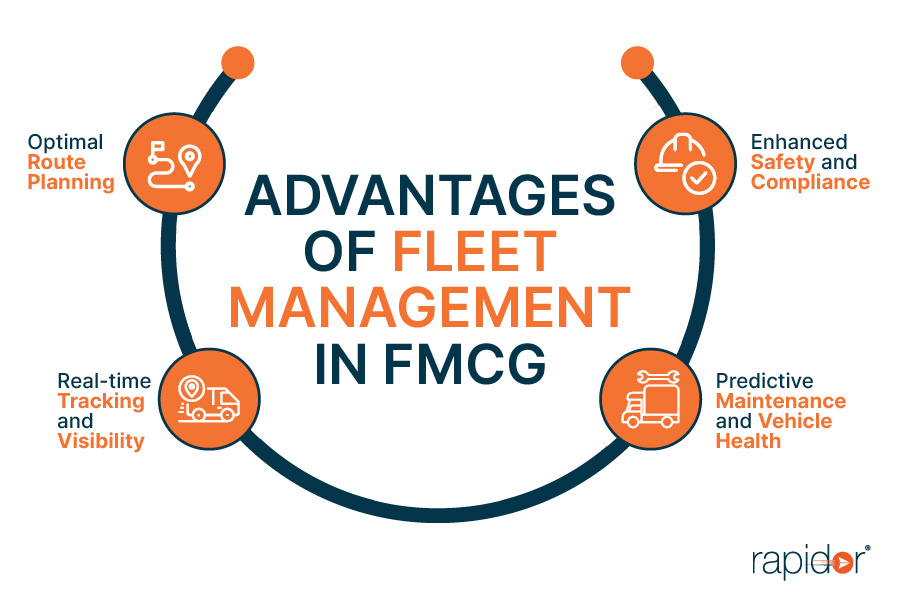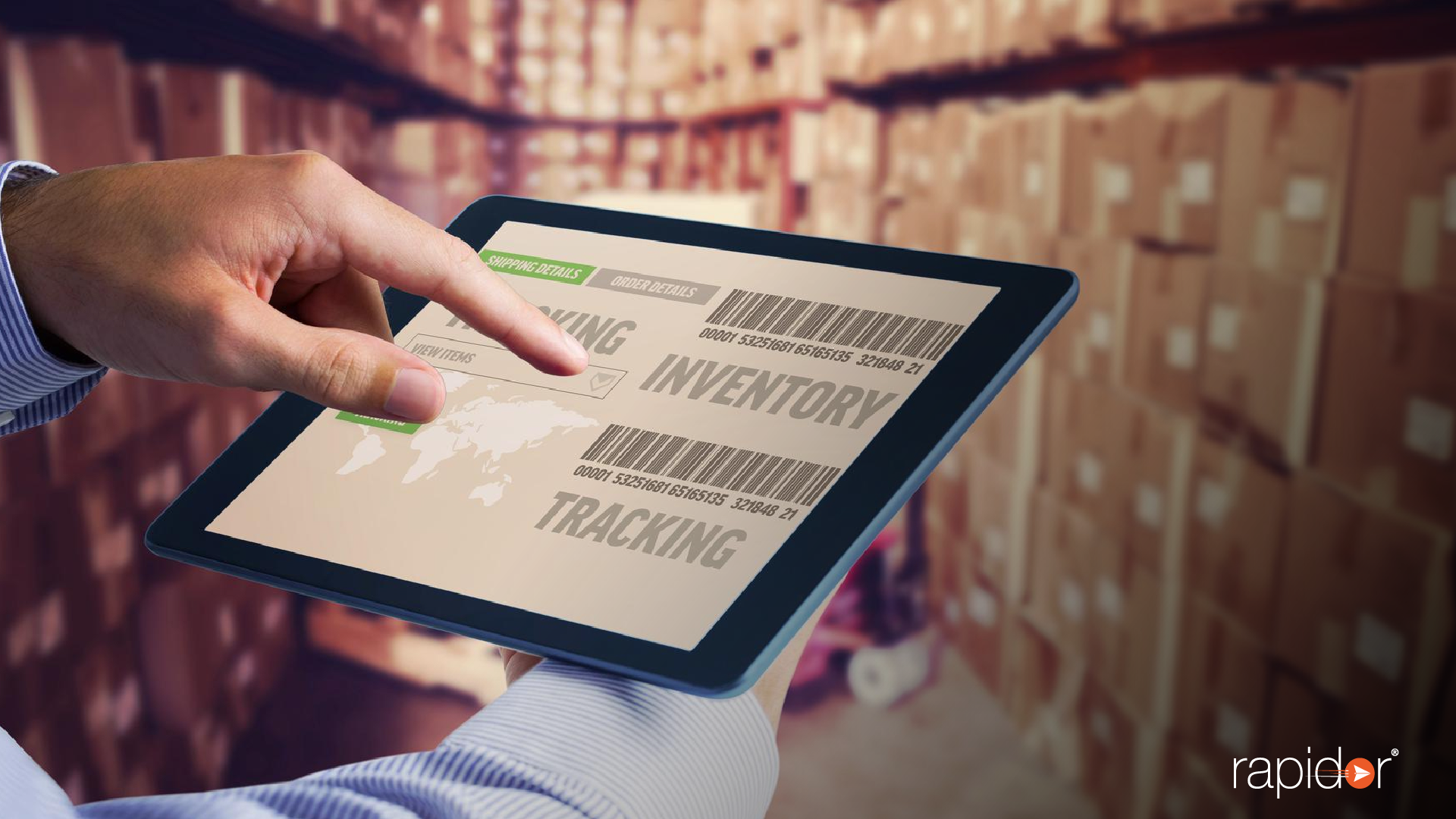The Fast-Moving Consumer Goods (FMCG) sector in India has witnessed remarkable growth, driven by consumer-driven demand, rising disposable income, and a burgeoning youth population. With its vast middle-class population, which is larger than the total population of the USA, and a median age of just 27, India’s FMCG market presents attractive opportunities for entrepreneurs and established brands alike. The FMCG market reached US$ 56.8 billion as of December 2022 and is expected to grow to US$ 220 billion by 2025. The sector’s ability to adapt to changing consumer preferences, embrace technology, and leverage government initiatives has contributed to its expansion.
This blog explores the dynamic landscape of the FMCG sector, focusing on the challenges faced in traditional logistics and the transformative role of Fleet Management Software in addressing these pain points. We delve into the strategic advantages of fleet management, backed by case studies exemplifying FMCG success, and conclude by envisioning the future of FMCG logistics empowered by efficient fleet management.
The FMCG Landscape: A Brief Overview
The FMCG sector in India has experienced rapid growth, fueled by factors like rising disposable income, increasing brand awareness among consumers, and a growing youth population. With household and personal care products accounting for 50% of FMCG sales, the industry plays a significant role in India’s GDP. The market size reached US$ 56.8 billion in 2022 and is expected to grow at a CAGR of 27.9%, reaching nearly US$ 615.87 billion by 2027.
Pacing of FMCG
FMCG operates at a swift pace characterized by frequent product launches to cater to dynamic consumer preferences. The industry faces the challenge of managing fast expiration or turnover rates due to the short shelf life of products.
Speed of Product Launches: FMCG companies need agile production and distribution systems to swiftly launch new products and capitalize on emerging trends.
Fast Expiration or Turnover Rate: The short shelf life of FMCG products necessitates efficient inventory management and distribution to prevent wastage.
Demand for Just-in-Time Delivery
In the FMCG sector, timely deliveries play a critical role in meeting consumer demands and maintaining customer loyalty. Delays in supply chain processes can result in lost sales and dissatisfied customers.
Importance of Timely Deliveries: Just-in-time delivery ensures products reach retailers and consumers precisely when needed, minimizing inventory holding costs and improving overall efficiency.
Consequences of Delays: Late deliveries can lead to stockouts, lost sales opportunities, and tarnished brand reputation, making it essential for FMCG companies to optimize their logistics for timely deliveries.
Traditional FMCG Logistics: Challenges and Pain Points
The FMCG industry has long relied on traditional logistics methods, which present several challenges and pain points that hinder operational efficiency and cost-effectiveness.
Manual Tracking Issues
- Human Errors: Relying on manual data entry and tracking leads to human errors in inventory management, order processing, and delivery schedules, resulting in inaccuracies and potential disruptions.
- Limited Real-time Insights: Manual tracking offers limited visibility into real-time supply chain data, making it challenging to identify bottlenecks, anticipate demand fluctuations, and respond swiftly to changes in market dynamics.
Vehicle Maintenance Overheads
Unscheduled Breakdowns: Traditional FMCG logistics face the risk of unplanned vehicle breakdowns, leading to delayed deliveries, customer dissatisfaction, and increased operational costs.
Maintenance Costs: Reactive maintenance practices often lead to higher maintenance expenses, as vehicles may not receive timely inspections and servicing, causing a negative impact on overall fleet performance.
Inefficient Route Planning
Wasted Time: Suboptimal route planning results in longer travel times, unnecessary detours, and inefficient allocation of resources, leading to higher fuel consumption and increased delivery lead times.
Fuel Inefficiencies: Inefficient route planning and lack of real-time traffic data contribute to fuel wastage, increasing operational expenses and environmental impact.
These challenges highlight the urgent need for FMCG companies to adopt advanced technologies and solutions to streamline their logistics operations, enhance productivity, and stay competitive in today’s dynamic market landscape. Transitioning from traditional logistics to innovative fleet management software can address these pain points and unlock numerous strategic advantages for the industry.
Introduction to Fleet Management Software and its Relevance to FMCG
What is Fleet Management Software?
Fleet Management Software is a comprehensive solution that leverages technology to optimize and streamline the management of a fleet of vehicles. It encompasses a range of core features, including real-time tracking, route planning, vehicle maintenance, and performance monitoring, enabling businesses to enhance fleet efficiency and reduce operational costs.
Fleet management software empowers FMCG companies with valuable insights into their fleet’s performance, enabling them to make data-driven decisions for improved productivity and customer service.
Synergy between FMCG and Fleet Management Software
As the FMCG sector embraces digital transformation, the integration of fleet management software becomes crucial for ensuring seamless logistics and meeting consumer demands promptly. The synergy between FMCG and fleet management software lies in its ability to align technology with the industry’s unique needs.
By integrating fleet management software, FMCG companies can:
Aligning Tech with Industry Needs
- Optimize Delivery Routes: The software offers intelligent route planning, reducing delivery lead times and fuel consumption, ensuring timely deliveries of perishable goods.
- Enhance Vehicle Performance: Fleet management software provides real-time vehicle diagnostics and predictive maintenance, minimizing breakdowns and maintenance costs.
- Improve Customer Service: With real-time tracking and ETAs, FMCG companies can offer accurate delivery updates to customers, enhancing their overall experience.
The relevance of fleet management software in the FMCG landscape underscores its potential to transform traditional logistics into a technology-driven, agile, and cost-effective system. By adopting this innovative solution, FMCG companies can gain a competitive edge, improve supply chain efficiency, and create a strong foundation for future growth and success.

Strategic Advantages of Fleet Management in FMCG
Real-time Tracking and Visibility
Instant Fleet Monitoring
Fleet management software offers real-time tracking capabilities, allowing FMCG companies to monitor their vehicles’ precise location, route, and status instantly. This level of visibility enables fleet managers to optimize routes, identify potential delays, and make quick decisions to ensure on-time deliveries.
Geofencing
Geofencing is a powerful feature that creates virtual boundaries on the map. FMCG companies can set up geofences around specific locations, such as warehouses or customer sites. Whenever a vehicle enters or exits these geofenced areas, the software triggers automatic alerts, providing better control over fleet movements and enhancing security.
Real-time Traffic Data Analysis
By integrating real-time traffic data into the fleet management software, FMCG companies can adjust routes on the fly to avoid congested areas and reduce delivery delays. This data-driven approach optimizes fleet efficiency, shortens travel times, and enhances the overall reliability of deliveries.
Enhanced Customer Service
- Predictable and Accurate Delivery ETAs
Real-time tracking and traffic data enable FMCG companies to provide customers with accurate estimated time of arrivals (ETAs) for their deliveries. This transparency fosters trust and customer satisfaction, leading to improved loyalty and brand reputation.
- Instantaneous Updates to Clients
With fleet management software, FMCG companies can automatically send proactive updates to customers regarding the status of their deliveries. This includes notifications about vehicle departures, expected delivery times, and any unexpected delays. By keeping customers informed, the software enhances the overall customer service experience.
Optimal Route Planning
Efficient route planning is crucial for FMCG companies to reduce operational costs and enhance delivery performance. Fleet management software offers several benefits in this regard:
Reducing Operational Costs
By optimizing routes, fleet management software minimizes fuel consumption, reduces overtime expenses, and lowers wear and tear on vehicles. This leads to significant cost savings for FMCG companies, improving their bottom line.
Decreasing Delivery Turnaround Times
Fleet management software continuously evaluates traffic conditions and road closures, providing real-time route adjustments. This dynamic routing helps drivers avoid traffic congestion and obstructions, leading to faster and more efficient deliveries.
Automatic Rerouting
In cases of unexpected events or road closures, the fleet management software automatically recalculates the best alternative routes. This feature ensures that deliveries stay on track, even in challenging situations, enhancing delivery reliability.
Predictive Maintenance and Vehicle Health
Fleet management software empowers FMCG companies with insights into their vehicles’ health, enabling proactive maintenance and cost-saving measures:
Decreasing Downtimes
The software continuously monitors vehicle diagnostics and identifies potential issues before they escalate. This proactive approach to maintenance reduces unplanned downtime and ensures that vehicles are always in optimal condition for deliveries.
Vehicle Health Insights
Fleet management software collects and analyzes data on vehicle performance, engine diagnostics, and maintenance schedules. These insights help fleet managers implement preventive maintenance strategies, ensuring that vehicles operate at peak efficiency.
Proactive Servicing Schedules
By analyzing vehicle data, the software generates predictive maintenance schedules. This enables FMCG companies to perform servicing and repairs at the most opportune times, reducing maintenance costs and preventing costly breakdowns.
Enhanced Safety and Compliance
Fleet management software promotes safe driving practices and regulatory compliance, leading to improved safety and reduced legal risks:
Driver Behavior Analysis
The software tracks driver behavior, including speeding, harsh braking, and acceleration. Fleet managers can use this data to provide targeted safety training, incentivize safe driving, and reduce accidents.
Monitoring Driving Habits
By monitoring driver hours and rest periods, fleet management software helps FMCG companies comply with labor regulations and prevent driver fatigue, ensuring safer and more responsible driving practices.
Safety Training Based on Data
The software’s data-driven approach enables FMCG companies to identify high-risk driving behavior and implement tailored training programs to enhance driver safety and reduce accidents.
Ensuring Regulatory Adherence
Fleet management software automates logging and record-keeping processes, ensuring that FMCG companies meet regulatory requirements effortlessly. Automated compliance tracking minimizes paperwork and mitigates legal risks.
The strategic advantages of fleet management software in the FMCG sector are evident in its ability to optimize logistics, enhance customer service, reduce costs, and improve safety and compliance. By harnessing the power of technology, FMCG companies can stay ahead of the competition, elevate their operational efficiency, and deliver superior value to their customers.
Conclusion: The Future of FMCG Logistics with Fleet Management
In conclusion, the future of FMCG logistics looks promising with the integration of fleet management software. The challenges faced by the industry, such as manual tracking issues, vehicle maintenance overheads, and inefficient route planning, can be effectively addressed through advanced technology and real-time insights. Fleet management software offers strategic advantages, including enhanced tracking, optimal route planning, predictive maintenance, and improved safety compliance, leading to cost savings and heightened customer satisfaction. As the FMCG sector continues to grow and embrace digital transformation, the adoption of fleet management solutions will play a pivotal role in shaping a more efficient, reliable, and sustainable supply chain.
Call-to-Action
Are you ready to optimize your FMCG logistics and elevate your supply chain performance? Embrace the future of fleet management software to streamline operations, reduce costs, and deliver exceptional customer service. Take the first step towards transforming your distribution network by exploring the range of fleet management solutions tailored to meet the unique needs of the FMCG industry. Embrace innovation and stay ahead in the competitive landscape of fast-moving consumer goods.
FAQ
Q: What is fleet management software, and how does it benefit the FMCG industry?
Ans: Fleet management software is a comprehensive solution that helps FMCG companies efficiently manage their fleet of vehicles and optimize logistics operations. It provides real-time tracking, route planning, and predictive maintenance, leading to cost savings, improved customer service, and enhanced safety compliance.
Q: How can fleet management software ensure timely deliveries for the FMCG sector?
Ans: Fleet management software enables instant fleet monitoring, geofencing, and real-time traffic data analysis, allowing FMCG companies to track their vehicles’ locations and traffic conditions. This helps in optimizing routes and ensuring on-time deliveries, enhancing customer satisfaction.
Q: Can fleet management software reduce vehicle maintenance overheads for the FMCG sector?
Ans: Yes, fleet management software facilitates predictive maintenance and vehicle health insights, reducing unscheduled breakdowns and maintenance costs. By identifying potential issues early on, FMCG companies can proactively service their vehicles, leading to reduced downtime and extended vehicle lifespan.
Q: How does fleet management software enhance safety and compliance in the FMCG industry?
Ans: Fleet management software offers driver behavior analysis, monitoring driving habits, and safety training based on data. It also ensures regulatory adherence by auto-logging for compliance and providing alerts for potential violations, helping FMCG companies maintain high safety standards.
Q: Is fleet management software scalable to accommodate the growing needs of the FMCG sector?
Ans: Yes, fleet management software is designed to be scalable, allowing FMCG companies to adapt as their fleet and logistics requirements expand. It can handle increasing volumes of data and operations, making it a versatile and future-proof solution for the fast-paced FMCG industry.


